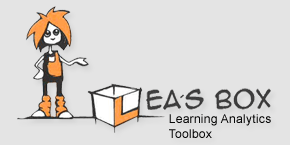DojoIBL is a platform that helps teachers and students to flexibly structure, organize and orchestrate collaborative learning processes.
A detailed User Guide to DojolBL is provided here
(https://docs.google.com/document/d/1Sgw4YJ4AzZnAVrI6M61apo7fw49hHXihVeIyG348BC4/edit)
LearnWeb is a learning and competence development environment which allows users to share and collaboratively work on resources collected from the Web or user-generated (Marenzi, Zerr 2012). It provides users with a search interface for resource discovery and sharing across various Web 2.0 services, such as YouTube, Flickr, Ipernity, Vimeo, and Bing, as well as LearnWeb itself, and can offer a personal Web 2.0 learning space. User Guide [TO BE PROVIDED] References Marenzi Ivana & Zerr Sergej (2012): Multiliteracies and active learning in CLIL: the development of LearnWeb2.0. IEEE Transactions on Learning Technologies (TLT). Los Alamitos, CA, USA, 5(4), 336-348. DOI:10.1109/TLT.2012.14. Marenzi Ivana (2014). Multiliteracies and e-learning2.0. Foreign language pedagogy content- and learner-oriented, Vol.28. Peter Lang, Frankfurt am Main. ISBN 978-3-631-65652-5 Bortoluzzi Maria & Marenzi Ivana (2014): YELLing for collaborative learning in teacher education: users’ voices in the social platform LearnWeb2.0. International Journal of Social Media and Interactive Learning Environments (IJSMILE), 2(2), 182-198. Bianchi F., Marenzi I. (2016). “Investigating student choices in performing higher-order comprehension tasks using TED talks in LearnWeb”. Lingue e Linguaggi, 19, 23-40. LEA’s BOX offers a learning analytics toolbox that is intended to enable educators to perform competence-centred, multi-source learning analytics based on:
- the foundations of sound psycho-pedagogical models,
- intelligent model-based reasoning services,
- innovative visualization techniques, and
- tailored to the very concrete demands and requirements of teachers and learners.
Lea’s Box offers new insights into learning processes by displaying the “structure of learning”. Directed graphs reveal the options of each individual learner, her strengths and concrete competencies gaps. Lea’s Box makes the step from analytics to formative analytics.
LeMo (monitoring of learning processes on personalizing and non-personalizing learning management systems) is a a web based Learning Analytics application, which provides detailed information on user navigational patterns within learning management systems and identifies needs for enhancement and revision of the learning offer. The prototype supports personalizing learning management systems that require a login for access as well as online encyclopedias that are non-personalizing, where neither login nor registration is needed to access content.
A special feature is that data analysis can be done independent of the respective platforms and hence it can be done across different platforms.
Moodle is one of the most popular and free platforms, add-ons for it would be good candidates for the tools section. Learning analytics and elearning reporting offer insights into the progress of learners and ensure that objectives are being met. Viewing trends of participation, submissions and other data can assist educators improve the elearning experience, vastly helping retention rates and student successes. The plugin features the following options:
- exclude tracking of admin users
- build full navigation tree for Piwik course category and activity tracking
- image based tracking in case javascript is disabled (for Piwik)
- advanced analytics for Google analytics (based on Bas Brands and Gavin Henricks work in 2013)
The plugin currently supports 3 Analytics modes, Piwik, Google Universal Analytics and Google Legacy Analytics.
IntelliBoard.net offers analytic and reporting services to education communities and institutions who use the Moodle LMS. IntelliBoard extracts the statistical data collected in Moodle, and presents this rich data on a single dashboard in the form of easy-to-read, aesthetic, and printable charts, graphs, and formatted reports.
In case one wants to do Analytics in the context of Serious Games and Virtual environments, the RGAE project offers a number of useful assets and plugins for conducting various types of analytics. myClass is a simple yet modular tool for teachers to make records about classroom activities and competence development. The idea is to equip teachers with a handy tool, tailored to small screen (such as smartphones) to enable them to make records about relevant activities and indicators of learning independent from other digital system. In that sense, myClass is a competency-oriented electronic classbook. The original and full version of myClass has been developed in the context of a prior project. In Lea’s Box we have reduced the functionality and tailored the tool to the very concrete needs of partner schools of the project. myClass offers features for competency tracking and basic reporting features. Of course, the tool has built in API towards the Lea’s Box platform. myClass comes with the fully functioning configuration tool for administrators. The Open Learner Modelling (OLM) system is a complex tool to model learners, conduct learning analytics, and visualize the results. The special strength of the OLM is that is opens the analytics processes to the learners and that it makes the result transparent; it allows users to select the appropriate visualizations and to start from high-level aggregations and drill down into the very details of evidences for learning. The OLM system technical is a JAVA application running on an Apache Server and connecting to a MySQL database. The download package contains detailed instructions. The OLM system is available as open source package.DojoIBL
LearnWeb
LEA's BOX - A Learning Analytics Toolbox
LeMo
Moodle
Piwik
IntelliBoard
Tools for serious games: RAGE
myClass
OLM








